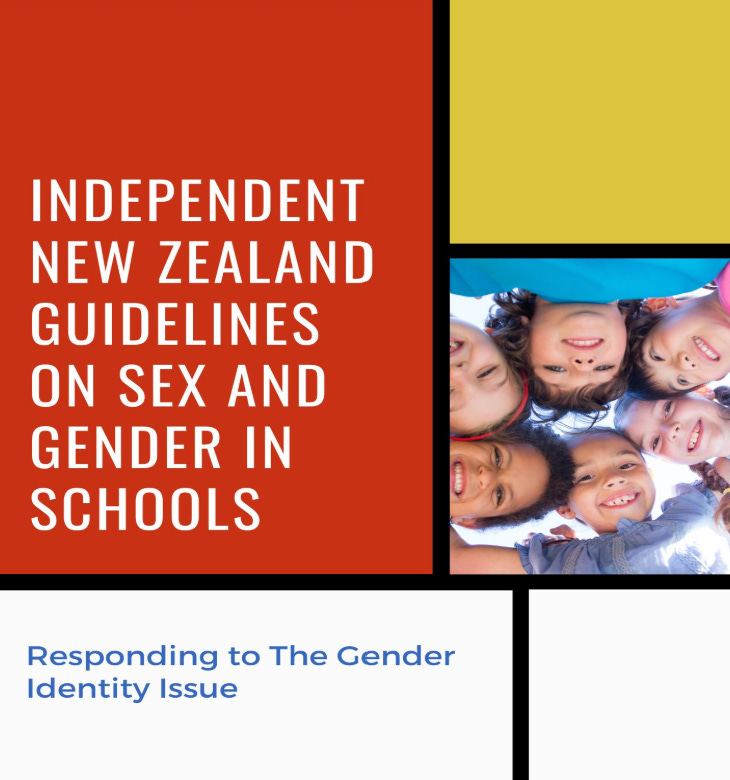In partnership with our Australian sister organisation, In Defence of Children, on Monday May 6, RGE sent all NZ schools the Independent New Zealand Guidelines on Sex and Gender in Schools.
The Guidelines for Australia were published by IDOC on its website in July 2023 and we have been working with them since then to create this New Zealand version. In the process, the document has been reviewed by senior educators, medical specialists, and a NZ Kings Counsel.
Purpose
The purpose of the Guidelines is to help New Zealand educators develop an understanding of how recent ideas about sex, gender, and identity are affecting the wellbeing of students, and to ensure schools consider the needs of all their students.
A growing number of children now identify as 'gender non-conforming', leaving some schools and educators unprepared for the complex issues that can arise in an area many teachers have little experience in. The rate of increase in minors who are considered to have gender dysphoria has been described as 'epidemic-like'. While many organisations offer support and advice for young people and their caregivers, their advice may not take into consideration the holistic duties that schools have to their communities. Some of these organisations provide information that is factually inaccurate and harmful to children. It is our goal to provide information, resources, talking points, perspectives, and a roadmap for the development of a New Zealand-wide respectful school climate that meets the needs of its diverse community in alignment with globally-recognised best practice and pedagogy.
Key Recommendations
Schools should appoint a small team of senior staff members to be the first point of contact for students, parents, and teachers and to keep abreast of the latest evidence in this fast-changing medical and ethical debate.
Schools must use relevant, up-to-date evidence to inform their policies. As reported by the Cass Review, there is no long-term, scientific evidence to support policies that immediately affirm a student in an adopted ‘gender identity’.
Schools must not facilitate ‘social transitioning’ as this is a psychological intervention that teachers are not qualified to make.
The role of the school is to neutrally ‘hold space’ while children develop their identities, not to influence them towards a medicalised pathway. The Cass Review found no solid evidence of the long term safety or efficacy of puberty blockers.
Name and uniform flexibility should be permitted while emphasising that non-conformity to sex stereotypes does not constitute evidence of ‘gender dysphoria’ or that the child is ‘transgender’.
Single-sex spaces and sports must be retained, with the additional provision of third ‘unisex’ spaces if needed.
Sex and ‘gender identity’ are distinct and should not be conflated in school records or policies.
Any change to a student’s birth certificate must be disclosed to the principal.
Clear and unambiguous language must be used, including standard English pronouns.
Decisions about school policies must be based on an open and fair dialogue with the school’s community, with everyone being free to express their point of view.
Transparency and consultation between professional staff and parents is paramount, unless there are exceptional circumstances.
Professional boundaries must be upheld at all times.
Teachers must ensure they are not projecting their own opinions or perspectives about sex and gender. They are reminded that their own sexual orientations do not form part of the curriculum.
Schools are strongly advised to seek specific legal guidance on all school policies relating to sex and gender.
How to use the Guidelines
Download and print the PDF (57 pages) and take it to your school principal or Board of Trustees or your local MP.
Write a letter to your BOT, using quotations from the Guidelines, and provide this link to the PDF. https://www.resistgendereducation.nz/information/nz-schools-guidelines
Write to the Minister of Education (who has been sent the Guidelines) and say you support its key recommendations.
A strange coincidence
The day after RGE sent our Guidelines to NZ schools, a new charity called Ethos also sent its own advice to schools on the same topic, and this was reported in the media. This unfortunate coincidence will no doubt lead to some confusion in schools about who said what.
Although the Ethos policy guide for schools also recommends a ‘watchful waiting’ approach, in contrast to our guide, it permits ‘social transitioning’ in schools in some circumstances.
RGE has consulted widely with senior educators and medical specialists to establish that ‘social transitioning’ is not best-practice policy. Our position is also upheld by the Cass Review (Chapter 12), where Dr Cass says: “…it is unclear whether [social transition] alters the trajectory of gender development, and what short- and longer-term impact this may have on mental health.” (p163)
Read more detail about the pitfalls of social transitioning here: Social Transitioning - The Risks & Harms.





So glad that RGE has done this! Although the Ethos policy guide is good, it hasn’t got the years of experience behind it that RGE collectively has.
This is excellent, thank you.